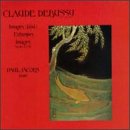Jacobs is a natural.
Ed Brickell | 11/28/2000
(5 out of 5 stars)
"It's so easy to make Debussy sound wrong -- one moment of bad timing or a misjudged accent and the dreamlike quality is lost, taking the listener right out of the piece. Jacobs' judgement of tempo and accenting sounds effortless. The music flows from him, catching Debussy's quicksilver changes of light and shade perfectly. These are older (1979) recordings of these timeless piano masterpieces, but the sound quality is excellent. They have been a mainstay in the Nonesuch catalog for many years now, and it's easy to understand why after you've heard them. Near-perfect Debussy, or as perfect as a flesh-and-blood piano player can hope to achieve. I've heard a lot of different pianists play these pieces, and Jacobs is the one I always come back to.One of the great classical music bargains."
Beautiful sound, very modern playing
Doug - Haydn Fan | California | 06/27/2007
(4 out of 5 stars)
"Readers unfamiliar with these works are in for a treat - these are the greatest pure piano music composed after Chopin. These particular performances were once available on long playing record, usually on second rate vinyl. Hearing them now on CD, released from such a lousy setting, shows off the quality of both Jacob's performance and the recording engineer's work. Jacobs takes almost infinite pains on these works, sorting each vertical as well as anyone. This makes the CD an excellent second choice for someone who owns the music already. However, for those who do not yet have these pieces on CD I strongly suggest considering Francois in stereo. If you can handle the idea of such colorful music in monaural you can consider the Gieseking CDs. (Though I would never suggest these pieces be heard initially in monaural!)
Jacobs frequently turns these exquisite keyboard tone poems into modern etudes, and is not as convincing as several other performers in maintaining Debussy's turn-of-the-century musicality, his rambunctious joie de vivre, and most importantly, his sudden bursts of full passion.
Listen to Jacobs dissect the opening of Hommage a Rameau, then try Samson Francois. Jacobs certainly shows off far more of the individual note colors, but he loses the cumulative impact delivered by Francois who insists on framing architectural elements as blocks. Listen, too, to Debussy performing his own music on the remarkable player piano CD for an idea of how big a role spontaneity plays in this music. Also, Debussy's works HAVE to be played with true imagination - pianists who insist on deconstructing these works have an uphill struggle capturing the sense of fancy permeating the atmosphere of each and every selection. (For example, Pollini brings immense technical authority to his Debussy - and a leaden imagination. Gieseking - by contrast - brings a wealth of creativity to these works.) Jacob's modernist natural disinclination to roll up his sleeves and really play legato and take chances holds him back. In compensation we do get as clear a presentation of Debussy's harmonies as possible.
I don't follow the reviewer's quibbling over the sound - the recording captures Jacob's remarkable sounds and...I certainly prefer the sound here to what Pollini gets on his much more recently recorded Debussy CD."


 Track Listings (12) - Disc #1
Track Listings (12) - Disc #1